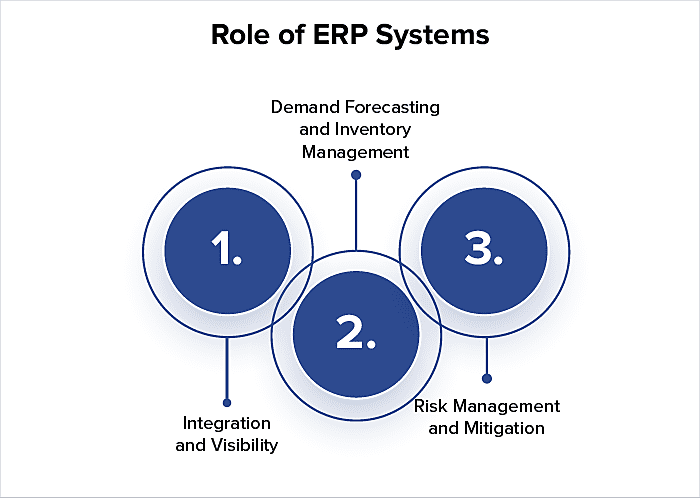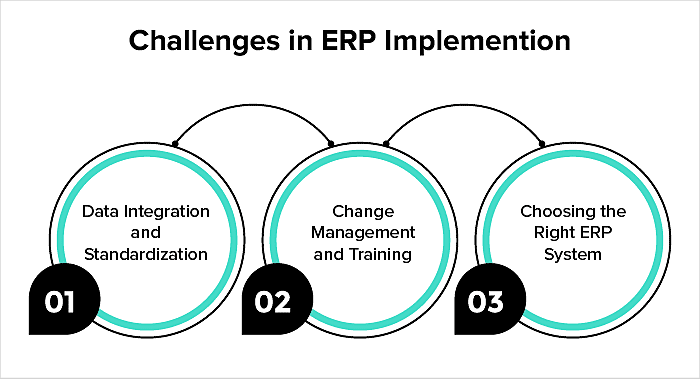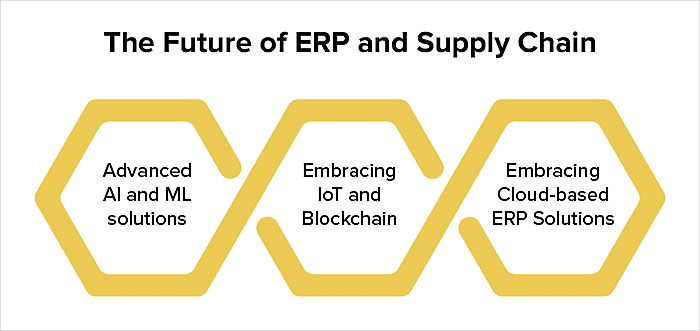
- How ERP in Supply Chain Management Impacts its Resiliency?
- The Role of ERP Systems in Enhancing Supply Chain Resilience
- Real-World Examples of ERP-Driven Supply Chain Resilience
- Overcoming Challenges in Implementing ERP for Supply Chain Resilience
- The Future of ERP and Supply Chain Resilience
- Wrapping up

Enterprise Resource Planning in supply chain management or ERP system in supply chain management have become some commonly heard terms for a few years. A Fortune Business Insights report states, in 2022, the global ERP market was measured at $44.47 billion and might cross $46.86 billion in 2023, at a CAGR of 6.2%. The ERP software market size is expected to cross a threshold of $71.34.
As for the role of ERP in supply chain management-based industries, the technology is catering to the requirements of modern business owners and helping them upscale their operations. Wondering how ERP and SCM go hand in hand? Keep reading this blog until the end!
How ERP in Supply Chain Management Impacts its Resiliency?
Supply chain resilience has become a crucial element for the success and survival of enterprises in today's globalized and linked economic world. Supply networks are subject to a variety of interruptions, including pandemics, natural catastrophes, and geopolitical unrest.
These hiccups can adversely affect the flow of goods, cause delays, raise prices, and erode consumer confidence. Consequently, the need of having robust supply networks has increased, and the best ERP for supply chain management systems is catering to that requirement.
1. The Growing Need for Resilience in Today's Supply Chains
With numerous stakeholders, extensive networks, and worldwide operations, modern supply chains are growing more and more complicated. They are more vulnerable because of their intricacy. As a result, businesses are realizing how crucial it is to strengthen the resilience of their supply networks. Resilience helps businesses to effectively prepare for, endure, adapt to, and recover from disturbances, maintaining business continuity and customer happiness.
2. Challenges Faced by Supply Chains in Achieving Resilience
Despite the fact that supply chain resilience is valued, enterprises nevertheless face difficulties in obtaining it. These difficulties include a lack of end-to-end visibility, disjointed systems and procedures, shaky demand forecasts, a lack of effective risk management tools, and insufficient supply chain partner communication. An all-encompassing strategy of supply chain processes with an integrated approach is needed to overcome these obstacles.
The Role of ERP Systems in Enhancing Supply Chain Resilience

The benefits of ERP in supply chain management have become possible thanks to ERP’s effective sets of features. ERP systems provide a variety of solutions that meet the difficulties faced by supply chain processes thanks to their integrated and comprehensive approach to company activities.
Let's look at some of the main ways that interpret the contribution of enterprise resource planning in supply chain management resilience.
1. Integration and Visibility: Strengthening Supply Chain Collaboration
The capacity of ERP systems to combine diverse departments and functions inside a business is one of its main advantages. ERP and supply chain management solutions provide real-time data exchange and visibility across the whole supply chain by integrating several systems and offering a consolidated database.
Through this connectivity and investing in the cost of developing ERP software smartly, stakeholders in supply chain management companies may quickly make informed decisions while also improving teamwork. Organizations can respond quickly to disturbances, reduce downtime, and guarantee smooth operations if they have access to accurate and up-to-date information.
2. Demand Forecasting and Inventory Management: Minimizing Disruptions
A good inventory management strategy, the best ERP software for supply chain management that delivers these requirements, and precise demand forecasts are essential elements of a robust supply chain. Strong modules and tools are available in several ERPs in logistics and supply chain management systems for demand planning, forecasting, and inventory optimization.
ERP systems give businesses the ability to estimate demand more effectively, optimize inventory levels, and avoid stockouts or excess inventory by examining historical data, market trends, and consumer behavior. This proactive strategy lowers expenses, increases customer happiness, and minimizes interruptions.
3. Risk Management and Mitigation: Identifying and Addressing Vulnerabilities
ERP systems offer thorough risk management capabilities, enabling businesses to recognize, evaluate, and reduce risks throughout the supply chain. Organizations can examine possible weaknesses like supplier dependability, geopolitical threats, or transportation interruptions using embedded risk assessment frameworks.
ERP systems make it possible to employ risk reduction techniques, including dual sourcing, alternate sourcing, and buffer stock building. Organizations may lessen the effects of interruptions and ensure the continuation of their supply chain operations by taking a proactive approach to risk management.
Real-World Examples of ERP-Driven Supply Chain Resilience
For many firms, using ERP software for supply chain management and logistics has improved the robustness of their supply chain management software and processes. Let's look at a few actual instances that demonstrate how ERP and supply chain management result in increased resilience.
Case Study 1: Enhancing Resilience Through ERP Integration
An ERP system in supply chain management systems was built by One Business, a multinational manufacturer, to connect its logistics, procurement, and production processes. The company leveraged several advantages of ERP in supply chain management after its deployment throughout the organization.
Through the integration of ERP and SCM processes and seamless departmental cooperation, procedures were streamlined, and visibility was increased. The ERP software for supply chains promptly recognized the problem during a supply chain disruption brought on by a supplier's insolvency, allowing the business to start making backup preparations.
Using the benefits of ERP in supply chain management, the company was able to minimize the effect on production and satisfy customer needs by utilizing real-time data and working with alternate suppliers, demonstrating the resilience attained through ERP integration.
Case Study 2: Effective Demand Forecasting and Inventory Management
When demand fluctuate seasonally, retailers faced tough issues that resulted in stockouts and surplus inventory. The firm increased inventory accuracy and gained better visibility into client buying habits by deciding to use ERP in supply chain management systems that could offer features like sophisticated demand forecasting and inventory management capabilities.
In order to maintain ideal inventory levels and minimize interruptions, this allowed merchants to modify their procurement and manufacturing strategies in real time. Consequently, the company's customer satisfaction increased, and the financial effects of supply chain delays were reduced.
Case Study 3: Proactive Risk Management and Mitigation
A logistics business used the risk management tools in ERP to improve the robustness of its supply chain. The ERP system gave real-time insights into possible threats by combining data from numerous sources, including weather forecasts, geopolitical developments, and transportation networks. This role of ERP in supply chain management enabled the organization to proactively identify weak spots in its supply chain and put mitigation measures in place. For instance, the ERP system notified DEF to reroute cargo during a port strike, guaranteeing prompt delivery to clients and minimizing the effect on operations.
Overcoming Challenges in Implementing ERP for Supply Chain Resilience

Although the best ERP for supply chain management systems have a lot to offer, using them may be difficult. In order to successfully integrate and optimize ERP systems inside the supply chain ecosystem, it is essential to overcome these obstacles.
1. Data Integration and Standardization: Breaking Silos
Integrating data from many systems and maintaining data uniformity are two frequent challenges. It may be challenging to obtain a unified view of the supply chain since different departments may utilize different legacy systems. Organizations must develop data governance frameworks that enable smooth data interchange and standardization in addition to investing in data integration solutions to address this issue. ERP solutions may harness the potential of precise and consistent data for enhanced decision-making and resilience by dissolving silos and establishing a single source of truth.
2. Change Management and Training: Empowering the Workforce
Implementing an ERP system requires a cultural shift within the organization. Employees must adapt to new processes, workflows, and tools. Effective change management strategies, including comprehensive training programs, communication plans, and employee engagement initiatives, are essential to ensure a smooth transition. By empowering the workforce with the necessary skills and knowledge to leverage ERP capabilities, organizations can optimize system utilization and maximize the benefits of ERP for supply chain resilience.
The organization has to undergo a cultural transformation in order to use an ERP system. New workflows, technologies, and procedures must be adopted by the workforce. To guarantee a seamless transition, effective change management measures, such as extensive training programs, communication plans, and staff engagement activities, are crucial. Organizations may maximize ERP advantages for supply chain resilience by equipping the workforce with the skills and knowledge needed to fully utilize its capabilities.
3. Choosing the Right ERP System: Customization and Scalability
The proper implementation of an ERP system is essential for supply chain resiliency. Organizations must assess their unique demands in order to select a system that supports their business objectives, scalability requirements, and industry-specific issues. In order to adapt the ERP system to distinct supply chain processes and workflows, customization options should be taken into account. Scalability is also essential to support future expansion and changing company requirements. To increase supply chain resilience over the long run, use an ERP system that is flexible and scalable.
The Future of ERP and Supply Chain Resilience

The future of supply chain resilience is still being shaped by the development of ERP systems. New trends and technology are transforming ERP system functionality and supporting robust supply chains.
1. Advancements in AI and Machine Learning for Predictive Capabilities
Predictive analytics capabilities are provided by the increasing integration of AI and machine learning into ERP systems. These tools analyze enormous volumes of data, spot trends, and predict future hiccups or changes in demand.
Organizations may improve their supply chain resilience by proactively implementing methods to reduce risks, manage inventory levels, and streamline operations by utilizing predictive capabilities. ERP systems' agility and responsiveness are increased because of AI and machine learning's ability to make data-driven judgments and drive proactive actions in real time.
2. IoT and Blockchain Integration: Enhancing Traceability and Transparency
Blockchain and Internet of Things (IoT) device integration with ERP systems improves supply chain traceability and transparency. IoT devices make it possible to track and monitor things in real time while collecting useful information about their position, state, and surroundings.
The integrity and visibility of supply chain information are guaranteed by this data, along with the immutability and security of blockchain technology. Utilizing these tools enables firms to locate the source of problems, promptly detect interruptions, and work with stakeholders to fix them successfully.
3. Embracing Cloud-Based ERP Solutions: Flexibility and Scalability
Due to its adaptability, scalability, and affordability, cloud-based ERP systems are becoming more and more popular. With the ability to access cloud ERP from any location, businesses can easily collaborate and share real-time data with supply chain partners that are spread out globally. The flexibility to scale resources up or down based on business demands is another feature of cloud-based ERP systems, providing optimal performance during periods of high demand or unplanned disruptions. Organizations may improve the agility and resilience of their supply chain operations by adopting cloud-based ERP systems.
Wrapping up
In conclusion, ERP systems are essential for improving the robustness of the supply chain. ERP systems give businesses the tools they need to handle disruptions and maintain operations by integrating and simplifying processes, supplying real-time insight, aiding demand forecasting and inventory management, and enabling proactive risk management.
Examples from the real world show how ERP improves supply chain resiliency. Success depends on overcoming obstacles through data integration, change management, and selecting the appropriate ERP system.
ERP systems will continue to fuel the development of robust supply chains as AI, machine learning, IoT, blockchain, and cloud technologies improve, giving businesses the capabilities they need to adapt, predict change, and succeed in it. Features offered by these ERPs in supply chain management systems are the reason why more software development companies in the USA, India, the UK, and other such markets are focusing on building high-quality ERP development services.

Content Writer
Arpit is a dreamer, wanderer, and tech nerd who loves to jot down tech musings and updates. Armed with a Bachelor's in Business Administration and a knack for crafting compelling narratives and a sharp specialization in everything from Predictive Analytics to FinTech—and let’s not forget SaaS, healthcare, and more. Arpit crafts content that’s as strategic as it is compelling. With a Logician mind, he is always chasing sunrises and tech advancements while secretly preparing for the robot uprising.












